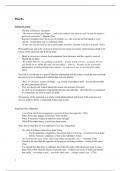Phaedo
Setting the scene:
- The day of Socrates’ execution
- ‘The master seemed quite happy… both in his manner and what he said; he met his death so
fearlessly and nobly,’ – Phaedo (58e)
- Socrates’ postulates that ‘the lovers of wisdom’ (i.e., the wise) do not fear death or even
suicide – if and when such is warranted. (61b)
- ‘A man who has devoted his life to philosophy should be cheerful in the face of death,’ (63e)
Philosophers are said to be ‘preparing themselves for dying and death,’ (64a) because death is the
release of the immortal soul from the body.
- Death is viewed as a release from temptation, base pleasures, and the cognitive costs of
inhabiting the body.
- ‘We neither hear nor see anything accurately… if these senses are not… accurate, the rest
can hardly be so,’(65b) ‘the soul can best reflect… when it… becomes as far as possible
independent, avoiding all physical contacts… as much as it can, in its search for reality,’
(65c)
The soul is viewed here in a quasi-Cartesian relationship with the body, as such the soul and body
are seen to be in an antagonistic relationship with one another.
- ‘Real’ or ‘absolute’ natures of things – e.g., beauty or goodness itself – are not discoverable
by sense-perception (65d-e)
- They are discovered without taking the senses into account. (65e-66a)
- As such, in an antagonistic relationship between soul and body – the body here is considered
to contaminate the soul in search for truth.
The purpose of the argument as a whole is both philosophical and moral; if the soul does not
survive death (or better, is immortal), S has much to fear.
Argument One: Opposites
- ‘everything which has an opposite is generated from that opposite’ (70e)
- When ß becomes bigger, it must have been smaller.
- When Ч becomes weaker, it must have been stronger.
- When Ф becomes better, it must have been worse.
Thus, does living then have an opposite? (71c) Yes, being dead.
- So, when П is dead, it must have been living.
o By the argument of opposites, this means that if it is living – it must have been dead
before. Socrates’ capitalises of this in his rebuttal to Cebes.
- ‘So it is from the dead, Cebes, that living things and people come?’ - Socrates (71d)
- If such is the case then the opposite of the process of dying would be ‘coming to life again’
(71e)
- It is argued then that there is sufficient proof that the souls of the dead must exist in some
place from which they are reborn (72a) and if not – if there is no cycle of death and rebirth
that exists, ‘everything would… reach the same state… change would cease’. (72b)
1
, So, the argument from opposites attempts to prove pre-natal soul, but post-mortem soul follows
by implication.
- Socrates: ‘Coming to life again is a fact, and it is a fact that the living come from the dead,
and a fact that the souls of the dead exist,’ (72d-e)
- Corroboration: If learning is recollection (Meno), ‘What we recollect now we must have
learned at some time before, which is impossible unless our souls existed somewhere before
they entered this human shape,’ (72e)
Is such an argument cogent then?
- (1) Small and big, tall and short, fast and slow are opposites
- But they are a comparative or relative, type of opposites.
- ß is not tall as a simpliciter (without qualification) – ß is tall when compared to Ч, relative to
Ч.
- As such - smallness, tallness, etc. can only be understood by comparison, and can be
compresent in one thing.
- E.g., ß is tall relative to Ч, but short relative to Г.
Contrast this then with living and being dead, which are opposites but non-relative. They are
absolute opposites. They behave differently logically; although being dead entails having been
alive, we cannot infer from being alive to having been dead.
Furthermore, we cannot be living relative to ß, but dead furthermore to Ч. So in at least two ways,
living and being dead are disanalogous to comparative or relative opposites.
Consider (2), the claim that without a cycle of living and dying, things would reach stasis and no
longer change. This does not follow, if things are born in a way or ways which are different from
the cyclical way that S postulates.
Consider (3), the appeal to recollection is cogent only if the theory of recollection is cogent.
Socrates then has given no argument in the Phaedo for this view. At best, he is simply appealing
to the argument in the Meno.
Argument Two: From equality
- Socrates revisits the recollection hypothesis as he refers to objects/people reminding one of
other objects/people.
- E.g., a portrait of Simmias reminding one of Simmias
- ‘Does it not follow from all this that recollection may be caused either by similar or
dissimilar objects?’(74a)
- Similarity comes in degrees (only partial to perfect) (74a)
- E.g., sticks are similar, to a degree, stones likewise.
- No two sticks or stones are perfectly similar, i.e., ‘equal’.
- Nonetheless though, we still have an idea of perfect/’absolute’ equality.
- ‘Where did we get our knowledge?’ (74b)
- By analogy with the portrait, imperfect objects remind us of perfect ones (74d)
- But how is this possible?
Socrates states: ‘Don’t you agree with me that anyone who receives that impression must…have
previous knowledge of that thing which he says the other resembles, but inadequately,’ (74e)
2




